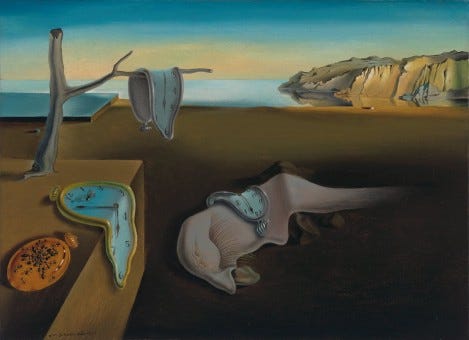
Well, it’s February and my New Year’s resolutions have already derailed. I had great plans and goals for writing and a myriad of other things, but it turns out resetting routines is hard work, especially if you schedule a family vacation in January and then get hit with the winter storm that wouldn’t go away. Though early December found me deeply in the rut of routine, ready for a break, now I’m longing for that structure and stressing that I “missed out” on January’s reset and reflection.
Of course, there isn’t anything magical about the turn of the year—goals can be set and habits created at any time. But there is something inherently human about doing certain things at certain times. Having a calendar. A routine. This is neither a modern nor secular invention––time and its passing has always been central to how the people of God have experienced God. It appears, in fact, that God designed us that way.
The Old Testament details how the Israelites were to organize their time, both their feasting and their fasting, around remembering who God is and what He had done for them. While there are no explicit instructions in the New Testament as to whether Christians should continue that calendar or not, the early church took the structure as inspiration to organize their year around the events of the Gospel. There’s some variability in what’s called the church or liturgical calendar, depending on whether you celebrate saints and which ones, but the basics are the same: there is sacred time and ordinary time, feast days and fast days.
If you have a liturgical background, you probably know this routine far better than me! My background is more ‘low church’ and I’ve only more recently stumbled into a practice of the church calendar. I am not naturally particularly organized, so I have found peace in the structured rhythm: a time for everything and for everything, a time. A time to rejoice, a time to reflect. One season for the incarnation, another for the resurrection. A fast for the dark, a feast for the light.
There is a humility, too, in ordering our year around the idea that we are but limited creatures, able to hold on to a few things at a time and, yet, through time, God has given us a way to enter into relationship with His eternal and abounding nature. God holds three Persons and one nature in Triunity and, in Christ, joins humanity and divinity together in a seamless union. We, however, are mere mortals and need time and space to experience God in all His glory and gospel.
As you review your resolutions and order your days, it is worth considering how God orders time, and even perhaps drawing wisdom from the historical church. If nothing else, let me offer you my biggest takeaway from practicing the church calendar: don’t over-emphasize the sacred days. The liturgical calendar divides time into two main categories: sacred or holy (as in ‘holi-days’), and ordinary. Right now, for example, we are in ordinary time, in between the sacred times of Epiphany and Lent.
Ordinary, by definition, is unexciting. Mundane. Normal. This doesn’t sound particularly desirable—we like things to be special or original. But then again, it depends on your perspective. There is a relief in routine check ups, expected outcomes, precedented times. Things that go according to plan. A routine you can depend on. Ordinary time is not the same as sacred time, but it is still sacred to God, with its own particular beauty and holiness.
I am often tempted to spend this ordinary time looking ahead to the next thing. Planning, prepping, optimizing the year—all things that need to be done! But today is not a waiting room or a clip in a montage scene; it is, after all, a day that the Lord has made, whether or not things go according to plan or routine. Let us, as Psalm 118 suggests, rejoice and be glad in it.
Soundtrack: Joyful by Dante Bowe and Living My Best Life by Ben Rector
Links and Things:
You probably already did your goal-setting and thinking through the year, but in case you’re like me and your routine already needs an adjustment, here are some of my favorites:
The Common Rule by Justin Whitmel Earley
Easy to follow and implement, this book felt like both a challenge and an exhale at the same time, and I continue to go back to it to refresh my habits.Ruthless Elimination of Hurry by John Mark Comer
I was afraid to read this book because I was pretty sure it was written to me, but instead of being shame-inducing, it was delightfully reframing and thought-provoking. I’m still thinking on it.Little Pilgrim’s Progress by Helen L. Taylor and illustrated by Joe Sutphin
I can’t get over this book. You need to click on this link just to see how beautiful it is, but the beauty is as much in the writing as in the pictures. My kids loved it as much as I did, and I got as much out of reading about Little Christian and Christiana as they did.Sounding the Seasons by Malcom Guite
Guite has been the best and most gentle guide in organizing my days. His book of poetry for Advent and Christmas was life-changing for me. If you’re not sure about poetry, I’d wait and start with his Lent and Easter book, or look him up on youtube — I promise, you will not regret it.“In Memoriam” by Lord Alfred Tennyson Living into the idea that it’s never too late to reset, here’s my favorite New Year’s poem. Not a poetry person? You can handle this one. Pro tip: read a poem out loud to yourself and it will hit different.
In Real Life:
Bookshelf: My current reading is a bit slim as I’m trying to move along in my PhD, but I’m really excited to read Women and the Gender of God by Amy Peeler. Let me know if anyone wants to read it with me; otherwise, I will report back!
A moment in time:
Thanks for reading!
Caroline





You are a gifted writer and I am always glad to see your emails pop into my inbox.